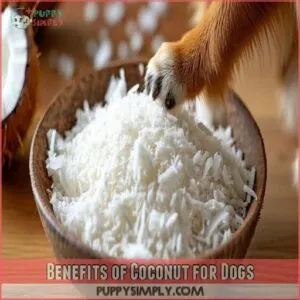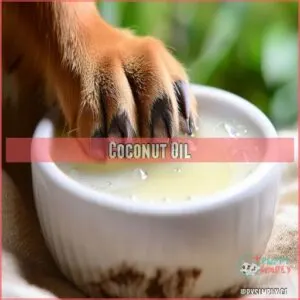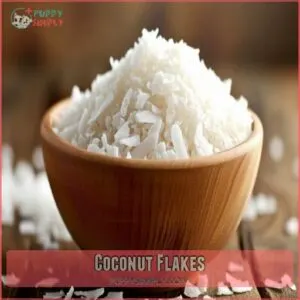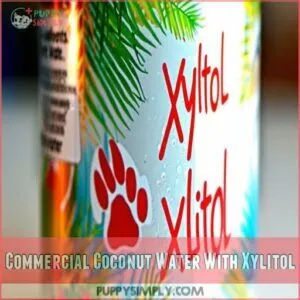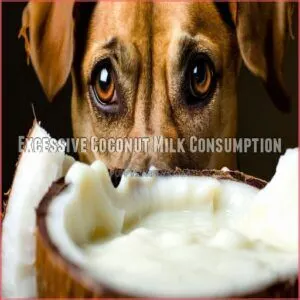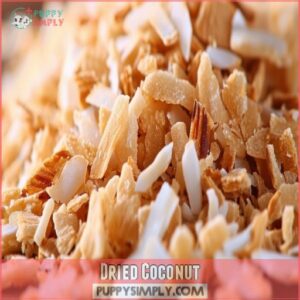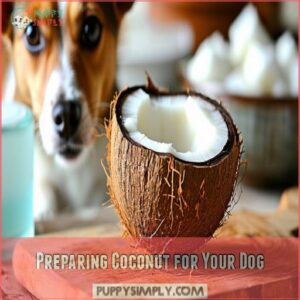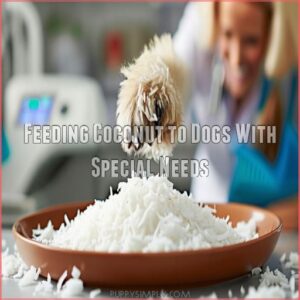This site is supported by our readers. We may earn a commission, at no cost to you, if you purchase through links.

Coconut flesh isn’t toxic and offers benefits like improved skin health and digestion, but it’s high in calories and fats.
You’ll want to start with small amounts – think bite-sized pieces rather than whole chunks.
Fresh coconut meat is your best bet, while sweetened or processed varieties are best avoided.
If your pup’s never tried coconut before, watch for any tummy troubles or allergic reactions.
From coconut oil to water, there’s more than one way to share this superfood safely with your four-legged friend.
Table Of Contents
- Key Takeaways
- Benefits of Coconut for Dogs
- Can Dogs Eat Coconuts Safely
- Safe Coconut Options for Dogs
- Coconut Products to Avoid for Dogs
- Preparing Coconut for Your Dog
- Feeding Coconut to Dogs With Special Needs
- How Much Coconut is Safe for Dogs
- Frequently Asked Questions (FAQs)
- Can puppies eat coconut?
- Can eating coconut sugar give me diabetes?
- Can dogs eat coconut fruits?
- Can dogs eat coconut flesh?
- Can dogs eat coconut sugar?
- Can dogs eat coconut oil?
- Is it okay for dogs to eat coconut?
- Can dogs eat the skin of a coconut?
- Can dogs have coconut to chew on?
- What should I do if my dog ate coconut shell?
- Does coconut help with my dogs arthritis pain?
- Can puppies under 6 months eat coconut products?
- Will coconut oil make my dog gain weight?
- Does coconut interact with common dog medications?
- Can dogs eat frozen or dried coconut products?
- Conclusion
Key Takeaways
- You can feed your dog coconut in moderation, starting with small bite-sized pieces, as it supports skin, coat, and digestive health.
- Always remove the coconut shell and husk to prevent choking hazards or intestinal blockages.
- Introduce coconut gradually and watch for any signs of allergies or digestive upset, like bloating or diarrhea.
- Consult your vet before adding coconut to your dog’s diet, especially if they have health conditions or are on medications.
Benefits of Coconut for Dogs
You’ll be amazed at how coconut can boost your dog’s health with its powerful mix of healthy fats, fiber, and natural compounds that support everything from skin to digestion.
Your furry friend can enjoy the benefits of this tropical treat in moderation, as it helps improve their coat’s shine, supports their immune system, and even freshens their breath.
Skin and Coat Health
Your dog’s coat health can transform with the right treatments for skin allergies over the counter allergy relief. Your dog’s coat health can transform with the right natural remedies.
Coconut’s rich fatty acids work wonders for dry, itchy skin and excessive shedding.
Here’s what you might notice:
- A shinier, more lustrous coat that feels silky to the touch
- Less scratching and reduced skin irritation
- Decreased dandruff and fewer hot spots
Try mixing coconut oil with oatmeal for a soothing DIY treatment that’ll have your pup’s coat looking show-ready in no time.
Digestive Health
Dogs struggling with tummy troubles might find coconut to be a natural digestive aid.
The fiber and healthy fats help keep things moving smoothly through their digestive system.
Plus, coconut’s natural compounds can promote healthy gut bacteria.
| Digestive Benefit | How It Works | Recommended Amount |
|---|---|---|
| Fiber Support | Aids regularity | 1-2 tsp daily |
| Gut Flora | Promotes probiotics | Start with 1/4 tsp |
| Gentle Digestion | Soothes stomach | Mix with meals |
| Fat Absorption | Improves nutrient uptake | Monitor tolerance |
| Metabolism Boost | Enhances digestion | Adjust as needed |
Immune System Support
Anyone looking to boost their pup’s immune system might find a natural ally in coconut.
Coconut‘s medium-chain triglycerides help support your dog’s defense mechanisms, while lauric acid acts as a powerful antibacterial agent.
When you’re dealing with a senior dog or puppy, these immune-boosting properties can be especially beneficial.
Just remember to introduce coconut gradually and watch for any digestive changes.
Anti-Inflammatory Properties
Beyond boosting immunity, coconut’s natural compounds work wonders for pups dealing with inflammation.
The medium-chain fatty acids found in coconut can help reduce joint pain and ease arthritis symptoms in older dogs.
For topical relief, consider using products specifically designed for coconut oil dog skin care, such as those found at coconut oil for dogs.
When applied topically, coconut oil soothes skin irritation and allergies, making it a gentle solution for itchy spots. Just remember to start with small amounts to see how your furry friend responds.
Antimicrobial Properties
With its natural antimicrobial properties, coconut helps combat harmful bacteria in your dog’s mouth, gut, and skin.
You’ll notice fresher breath as coconut fights oral bacteria, while its medium-chain fatty acids can help tackle yeast infections and ear problems.
Think of coconut as nature’s cleanser – it supports your pup’s microbiome balance without harsh chemicals.
Just remember to start small and watch for any sensitivities.
Can Dogs Eat Coconuts Safely
If you’re wondering whether coconuts are safe for your furry friend, you’ll want to know that they can enjoy this tropical treat in moderation as long as you remove the husk and serve appropriate portions.
Coconuts offer health benefits like improved digestion and coat health.
You’ll need to check with your vet first, especially if your dog has any underlying health conditions or dietary restrictions.
Factors to Consider
Before giving your pup coconut, three key factors deserve your attention:
- Your dog’s age plays a huge role – puppies and seniors need extra care with new foods
- Different breeds have varying digestive sensitivities – what works for a Lab mightn’t suit a Chihuahua
- Your dog’s current health status matters – existing conditions can affect how they process coconut
Start small and watch how your four-legged friend responds.
Think of it like introducing a new teammate to the pack – you’ll want to take it slow.
Consult a Veterinarian
Talking to your vet about coconut is a smart move, especially if your dog has health conditions or is pregnant.
They’ll help you figure out the right amount based on your pup’s size, age, and overall health.
Your vet can also recommend specific ways to serve coconut that work best for your dog’s needs, whether it’s through treats, oils, or mixed with regular food.
Potential Allergies
While probiotics can help alleviate dog allergies by promoting healthy gut bacteria, reducing allergy symptoms, coconut allergies in dogs are rare, they can occur.
Just like humans, your furry friend might show sensitivity to this tropical treat.
Here are key signs to watch for:
- Itchy or red skin patches
- Excessive paw licking or face rubbing
- Swelling around the face or throat
- Difficulty breathing
- Unusual lethargy or behavioral changes
If you notice any of these symptoms after introducing coconut, stop feeding it and contact your vet immediately.
Gastrointestinal Considerations
Three key digestive factors come into play when feeding your dog coconut.
First, its high fiber content can help with regularity but might cause bloating if overdone.
You’ll want to watch for signs of stomach upset, especially when first introducing coconut to your pup’s diet.
If your dog shows any digestive issues like diarrhea, reduce the amount or stop feeding coconut temporarily.
Safe Coconut Options for Dogs
You’ll be glad to know that several coconut options are perfectly safe for your furry friend, including fresh coconut meat, coconut oil, and unsweetened coconut water.
When you’re choosing coconut products for your dog, you’ll want to stick with pure, natural options without added sugars or artificial sweeteners, keeping portion sizes small to prevent digestive issues.
Coconut Meat
Fresh coconut meat offers your furry friend a tasty and nutritious treat when served correctly.
Now that you know it’s safe, let’s look at the best ways to serve this tropical delight.
Here’s what makes coconut meat a great choice for your pup:
- Natural fiber content helps with digestion
- Rich in minerals like manganese and potassium
- Contains healthy medium-chain triglycerides
Just remember to serve bite-sized pieces without the brown skin, and always start with small portions to see how your dog responds.
Coconut Oil
Coconut oil packs a powerful punch for your dog’s health.
It’s great for tackling dry, itchy skin and can even help with digestion issues.
You can mix a teaspoon into their food or apply it directly to their coat for a natural shine boost.
Just remember to start small – too much of this good thing might upset their stomach.
Coconut Water
While coconut oil can boost your pup’s health from the outside in, natural coconut water offers a delightful twist on hydration.
Here’s what you should know about giving your dog this tropical drink:
- Natural coconut water is safe and hydrating
- Skip commercial versions that might contain xylitol
- Serve it plain – no added sugars or flavors
- Keep portions small to avoid tummy troubles
It’s like nature’s sports drink for your four-legged friend!
Coconut Flakes
Looking to switch up your pup’s treat game?
Natural coconut flakes offer a tasty alternative packed with healthy fats and fiber.
You’ll want to choose unsweetened, unsalted varieties and serve them in moderation.
They’re perfect for sprinkling on regular meals or as a safer alternative to chocolate treats, such as Chocolate Ice Cream Risks, incorporating into homemade dog treats.
Start with a pinch to test your dog’s reaction, and remember – like any treat, they’re meant to be occasional.
Coconut Milk in Moderation
If you’re thinking about giving your pup coconut milk, you’ll want to keep portions tiny.
Unlike coconut flakes, coconut milk packs a hefty dose of calories and fat that could lead to weight gain.
A tablespoon or two mixed into their food is plenty – think of it as a special weekend treat rather than a daily addition.
Your furry friend’s waistline will thank you!
Coconut Products to Avoid for Dogs
While you’re excited to share coconut treats with your furry friend, you’ll need to know which coconut products could harm your dog.
You’ll want to avoid certain coconut items that can cause choking, digestive problems, or toxic reactions in your pet.
Coconut Husk
The rock-hard coconut husk poses a serious choking hazard for your furry friend.
Even small pieces can lead to dangerous intestinal blockages if swallowed.
You’ll want to keep those fibrous outer shells far from your pup’s reach – they’re not worth the risk.
Instead of tossing them where your dog might find them, add husks to your compost pile or use them in garden projects.
Commercial Coconut Water With Xylitol
You’ve got to be extra careful with store-bought coconut water for your pup – some brands contain xylitol, an artificial sweetener that’s highly toxic to dogs.
Even small amounts can cause dangerous drops in blood sugar, liver failure, and in severe cases, death.
Always check ingredient labels carefully before sharing any coconut water with your furry friend, or stick to fresh coconut water instead.
Excessive Coconut Milk Consumption
While watching for harmful additives in coconut water, don’t forget about coconut milk’s sneaky side.
Rich in fats and calories, too much coconut milk can upset your pup’s stomach and pack on unwanted pounds.
Even though it’s tempting to share your coconut curry or smoothie, stick to small tastes.
A tablespoon or two as an occasional treat is plenty for most dogs.
Dried Coconut
Speaking of coconut products, dried coconut needs special attention. Just like us reaching for that bag of crispy coconut flakes, your pup might beg for a taste. When considering coconut for your dog, be aware that coconut allergies exist.
But here’s what to watch for:
- Dried coconut can be harder to digest than fresh coconut meat
- Some brands add sugar or preservatives that aren’t dog-friendly
- Flakes might pose a choking risk for small dogs
- Excessive fiber can lead to tummy troubles
- Unsweetened varieties are safer but still need moderation
Preparing Coconut for Your Dog
You’ll want to be aware that while some nuts are safe for dogs, including peanuts and other safe options, others can be toxic, so it’s essential to research and choose the right ones. You’ll want to prepare coconut properly before adding it to your dog’s diet to make sure they get the most benefits while staying safe.
Whether you’re mixing coconut into treats or using it to hide medicine, there are several easy ways to incorporate this tropical ingredient into your pup’s meals.
Adding to Dog Treats
Making healthy treats for your pup is easier than you think.
Start by chopping fresh coconut meat into small, manageable pieces or using unsweetened coconut flakes.
Mix these with other dog-safe ingredients like mashed banana or peanut butter for tasty homemade snacks.
Just remember to keep portions modest – coconut should only make up about 10% of the treat mixture to prevent digestive issues.
Mixing With Kibble
Your dog’s kibble routine could use a tropical twist.
For an easy and convenient way to incorporate coconuts into your dog’s meals, you can also try a pre-made coconut kibble mix online (coconut kibble online).
Adding coconut to their daily meal boosts nutrition and can make mealtime more exciting.
Here’s how to mix it right:
- Start with a teaspoon of fresh coconut pieces or flakes per cup of kibble
- Mix thoroughly to distribute the coconut evenly
- Monitor your pup’s response for the first few days
Remember to introduce this change gradually to avoid upsetting their stomach.
Using Coconut Oil for Medication
Dogs who hate taking pills often need a clever solution.
Coconut oil can be a game-changer, making medication time less stressful for both you and your pup.
Here’s a handy guide for using coconut oil with medications:
| Method | Best For | Tips | Watch Out For |
|---|---|---|---|
| Pill Coating | Hard Pills | Thin layer only | Melting in heat |
| Mixed in Food | Powder meds | Stir well | Too much oil |
| Frozen treats | Liquid meds | Pre-measure | Storage time |
| Direct lick | Quick dosing | Use small amount | Mess potential |
Feeding Coconut to Dogs With Special Needs
If you’re caring for a dog with special dietary needs, you’ll need to take extra care when introducing coconut into their diet.
While coconut can offer benefits for dogs with diabetes or age-related issues, you’ll want to check with your vet first to make sure it’s safe for your furry friend’s specific condition.
Diabetic Dogs
Diabetic pups can safely enjoy coconut in moderation, thanks to its low glycemic impact.
If you’re managing your dog’s blood sugar levels, you’ll be glad to know that coconut meat and oil won’t cause dramatic insulin spikes.
Still, you should carefully monitor portions and talk to your vet first.
Consider using coconut oil for treats, but remember to factor these calories into your dog’s daily diet plan.
Puppies and Senior Dogs
When introducing coconut to puppies or senior dogs, extra caution is essential.
Puppies’ developing digestive systems can be sensitive, so start with tiny amounts – think pinhead-sized portions of coconut meat.
For senior pups, their slower metabolism means they’ll need even smaller servings.
Watch for any digestive upset like diarrhea or vomiting.
If your older friend has dental issues, coconut oil might be a gentler option than fresh meat.
Dogs on Specialized Diets
If your furry friend follows a specialized diet for health reasons, you’ll want to be extra careful with coconut treats.
For example, if they’re on a limited ingredient diet for food allergies, be sure to review the ingredient list carefully to avoid hidden ingredients, fillers, and by-products in coconut products, as outlined in limited ingredient puppy diets.
Whether it’s kidney disease, food allergies, or weight management issues, always check with your vet first.
They’ll help you determine if coconut fits into your pup’s dietary plan and can suggest the right amount that won’t interfere with their specific nutritional needs.
How Much Coconut is Safe for Dogs
You’ll want to start with just a teaspoon of coconut meat or oil for small dogs and up to a tablespoon for larger breeds to avoid overwhelming their digestive system.
While coconut offers health benefits for your furry friend, you’ll need to monitor their reaction and adjust the amount based on how well they tolerate this tropical treat.
Starting With Small Amounts
Before diving into coconut treats, start with tiny portions to see how your pup reacts.
Think of it like introducing a new friend – you want to take things slow and steady.
You can even try using store-bought coconut dog treats online to simplify the process.
Here’s your starter guide for coconut portions:
- Begin with a single small piece (about the size of your pinky fingernail)
- Wait 24 hours to check for any reactions
- Offer treats just twice a week initially
- Keep serving sizes under 1-2 teaspoons for most dogs
Monitoring for Bloating
After introducing coconut to your pup, watch closely for signs of bloating, especially if your dog has a history of fast eating habits that can lead to bloat.
If you’re considering adding coconut to your dog’s diet, check for signs of allergic reactions to coconut shavings. Your dog’s belly shouldn’t feel hard or look swollen after eating coconut treats.
Keep an eye out for restlessness, pacing, or attempts to vomit – these could signal discomfort.
Remember, every dog’s different, just like humans with new foods.
Think of it like being a food detective for your furry friend’s comfort.
Adjusting Coconut Intake
You’ve noticed your dog loves coconut, but now you’re wondering about the right amount.
Like finding the perfect coffee strength, adjusting coconut portions takes some trial and error.
Watch how your pup responds and scale servings based on their size – a Great Dane can handle more than a Chihuahua.
Start with small pieces once or twice weekly, adjusting as needed.
Consulting a Veterinarian for Guidance
While experimenting with coconut treats might be tempting, consulting your vet should be your first step.
They’ll consider your dog’s weight, age, and health conditions to recommend a safe serving size.
Your vet can also spot potential red flags, like existing digestive issues or medications that might interact with coconut.
Regular check-ins make sure you’re on the right track with this tropical addition to your pup’s diet.
Frequently Asked Questions (FAQs)
Can puppies eat coconut?
Puppies can safely enjoy small amounts of coconut after 8 weeks old.
Just like your little furry friend’s first steps, introduce it gradually.
Keep portions tiny and always remove the tough outer shell.
Can eating coconut sugar give me diabetes?
Coconut sugar won’t directly cause diabetes, but it’s still sugar that can impact blood sugar levels. Like any sweetener, moderation is key. Consider alternatives if you’re watching your sugar intake.
Can dogs eat coconut fruits?
Yes, your furry friend can enjoy fresh coconut meat and water in moderation.
It’s packed with healthy fats and fiber, but remove the husk first and keep portions small to avoid tummy troubles.
Can dogs eat coconut flesh?
It’s safe to feed your furry friend small amounts of fresh coconut flesh as an occasional treat.
You’ll want to remove the shell completely and cut the meat into bite-sized pieces to prevent choking hazards.
Can dogs eat coconut sugar?
While you can share many treats with your pup, coconut sugar isn’t recommended.
Though not toxic, it’s high in calories and offers no nutritional benefits.
Stick to healthier options for your furry friend.
Can dogs eat coconut oil?
Your furry friend can enjoy coconut oil in moderation – it’s safe and offers health perks like better digestion and a shinier coat.
Just start with small amounts and watch for any tummy troubles.
Is it okay for dogs to eat coconut?
Dogs can enjoy raw turkey necks in moderation as an occasional treat, offering benefits like joint and mobility support through glucosamine-rich snacks. Dogs can safely enjoy coconut in moderation as an occasional treat.
The fruit offers health benefits like improved digestion and coat health.
But stick to small portions and remove the shell to prevent choking hazards.
Can dogs eat the skin of a coconut?
The tough, fibrous skin of a coconut isn’t just dangerous – it’s a serious choking hazard and can cause nasty intestinal blockages in your furry friend.
Stick to the soft, white meat instead.
Can dogs have coconut to chew on?
No, it’s best to avoid giving coconut shells as chew toys – they’re too hard and can break teeth or cause choking.
Instead, offer bite-sized pieces of coconut meat as occasional treats.
What should I do if my dog ate coconut shell?
If your dog’s swallowed coconut shell, contact your vet immediately as it’s a serious choking hazard and can cause intestinal blockages.
Monitor for vomiting, lethargy, or loss of appetite while seeking medical attention.
Does coconut help with my dogs arthritis pain?
Coconut oil’s anti-inflammatory properties may help ease your dog’s arthritis discomfort.
Coconut oil is not a miracle cure, but you can try adding small amounts to their food after checking with your vet.
Can puppies under 6 months eat coconut products?
You’ll want to wait until your puppy is older than 6 months before introducing coconut products.
Their digestive systems are still developing, so it’s best to consult your vet first for personalized guidance.
Will coconut oil make my dog gain weight?
Like adding extra butter to toast, coconut oil can pack on pounds if you’re not careful.
While it’s packed with healthy fats, you’ll want to limit portions to prevent weight gain in your furry friend.
Does coconut interact with common dog medications?
Since certain oils can affect medication absorption, it’s smart to check with your vet before adding coconut to your pup’s diet.
Some medications may interact differently when combined with fatty foods like coconut.
Can dogs eat frozen or dried coconut products?
Fresh as a winter breeze, frozen coconut gives your pup a cool treat, while dried coconut offers a chewy adventure.
Both are safe in small amounts, but remove the tough outer shell first.
Conclusion
Ready to share some tropical goodness with your furry friend?
While the question "can dogs eat coconuts" has a positive answer, remember that moderation is key.
Start with small portions, monitor your pup’s reaction, and stick to fresh, unsweetened options.
Whether you’re adding coconut meat to treats or using coconut oil for their coat, this superfood can be a healthy addition to your dog’s diet when offered thoughtfully and in consultation with your vet.

